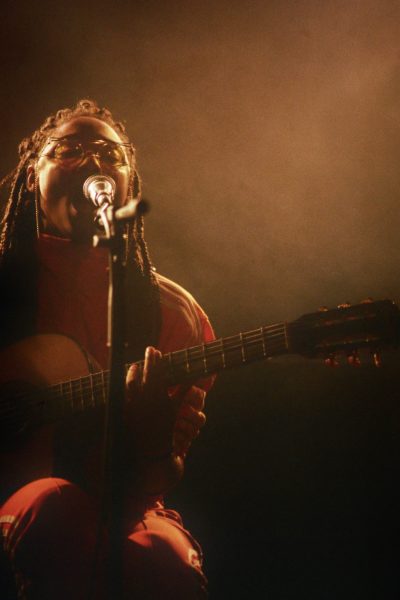Music has the power to move. The rhythm and the groove that does not let your feet stand still, the vocals that shoot shivers down your entire body and give you goosebumps, and the lyrics, that can express so much emotion. Well, I thought I knew what that felt like until a friend of mine took me to a show of the Brazilian singer and activist, Bia Ferreira. I am not sure if I got just how important music can be before that. From the first second the musician stepped on stage with her unpretentious acoustic guitar, the entire room illuminated. And even though the lyrics of her songs are exclusively in Portuguese – luckily my friend translated for me – I have rarely been this moved by music. That experience lies half a year in the past now but has continued to accompany and move me throughout this year. So when I heard that Bia Ferreira is coming back to Berlin, you could imagine I was pretty stoked. Coming all the way from Brazil to grace the YAAM with her powerful presence, I set up a meeting to talk about her music.
On the first very cold November day here in Berlin, I stand in front of the venue awaiting the interview. It has been a while since I was anxious about speaking to a musician but in the hours before our date, I am a nervous wreck. Partly, because over the past few months, I have turned into a huge fan of Bia’s music. Partly, because of the revolutionary and political power of Bia Ferreira’s music. Then the door to the cozy backstage room opens and a friendly face framed by a pair of stylish yellow shades greets me with a beaming smile. Not only on stage the energy of this artist is all-consuming. Glowing with positivity and spirit, her sparkling eyes immediately put a smile on your lips and heart. But when it comes to the topics close to her heart, the grin turns into a serious frown and the utter realness and urgency of her words chase a chill through your bones.


Different Realities
Bia Ferreira and I sit down on the spacious leather couch in the back. Clutching her leg, tucked into a giant colorful poncho covering the orange jumpsuit underneath, she contrasts our ready-for-winter in Berlin look of black on black. The singer just released her studio record Igreja Lesbiteriana following the live recording Ao Vivo, which has become one of my favorite records. And she just embarked on a tour taking her across the European continent. “Playing in Europe is much more comfortable”, she tells us. It is very different from the concerts she plays in her home country. “In Brazil, we live a different reality. More than fifty percent of the population is Black and it is the country that kills the most LGBTQ+ people in the world. Every 23 minutes a young Black person dies”, she gives us an insight into the state the country is in. “The right-wing party is growing, especially with the presidency of Bolsonaro. Many of my gigs get canceled and the police threaten me because they do not like what I say.”
“Playing in Europe is more comfortable because the people here actually know what is happening in Brazil. Here, people know what is going on and they believe in the revolution that I am part of. Back home, a lot of people do not have the chance to learn about our situation. Of course, in Brazil, people also believe in change, but the media are focused on promoting what the government says. It is hard to educate yourself. I hope that through my music I can spread the word and help those people who don’t have the opportunity to understand what is going on.”
Pushing Back
Brazil, disregarding its majority of Black people and people of Color, is highly discriminative. The structural and historic racism in Brazil keeps the Black population in poverty. Especially, since last January the right-wing politician Bolsonaro was elected president, the situation is continuously getting worse. “He has a plan to destroy Brazil,” Bia Ferreira laughs bitterly. While talking to her about the political situation I can clearly watch her mood shift. Her joyful character goes serious in a matter of seconds reflecting how close to her heart these topics are and how much anger and sadness they stir.
“He is selling all the resources, making the rich richer and the poor poorer. In ten months of his presidency, the workers have lost many of their rights. Especially women suffer. Our former president, Lula – who was finally released from prison recently – created a delegacy of women to take care of rape victims, which Bolsonaro annulled. Of course, things weren’t perfect and victim blaming has always been a problem, but now, instead of getting physical and psychological help, women simply get paid money to have the baby. In 2020 we will get to feel the results of the things he is working on,” she says dread visibly on her face. But Bia Ferreira also explains that with the growth of the political right-wing, resistance and solidarity are growing, too.

‘Being an artist in Brazil is to be marginalized,’ she goes on. The homophobic and racist police are prohibiting plays, and art, and go as far as taking artists off the stage. ‘Everything that is political, like talking about the struggles of the country, refugees, and racism they cut off. But that only makes the movement among the people stronger’, Bia says.
“All the artistic movements in Brazil are getting stronger. We are screaming and asking for help. The more he tries to erase us, the louder we will shout and we will keep doing what we are doing.”
Cota Não é Esmola
Bia Ferreira is continuously spreading her message and educating. She goes to schools and universities to perform and to talk about the discriminatory system and the ongoing and historic violence of colonialism. Her song Cota Não é Esmola is exactly about that. When applying for university, Cota tries to give Black people and People of Color who grew up with fewer opportunities because of racism and discrimination equal chances to get into universities. It was a push to try to break the circles of poverty, many young people find themselves caught in. Yet, many radicals, especially white conservatives oppose the rule, claiming that everybody has the same chance if they just work hard enough. Her song is dedicated to those who try to take down Cota by saying it is charity. “It is not a charity,” the artist rages. “We do not have the same opportunities and without changes in the government we will never be equal.” Cota is one step towards the long-fought-for equality, but with the current president, Bia is unsure whether they can keep it up. In her song, she channels the fury and frustration about the lack of understanding and support for Black people in Brazil.
“The right-wing is growing, but we are growing back. They do not want us there and that is exactly why we fight harder to find space and to speak up – because now we really need to be there!”
Falar
Listening to Bia speak highlights the urgency of these issues. “So what can we do from here?” I ask her. “Falar”, she says with eyes serious and sincere like deep wells. “Falar” means “speak” in Portuguese. “Speak as much and as loud as you can. You have to keep talking about the problems in Brazil. We do not expect what we say over there to arrive, but you are here, so it does resonate even outside the borders. Just keep talking about it!’
 From Europe, it is easier to acquire information about the situation in Brazil because the government does not control the media as heavily as they do there. “They are trying to drown us out and make it look like everything is okay. That is why we have to spread the word that things are not fine. Our economy has declined rapidly. We have had episodes of hunger and diseases, which have been eradicated years ago and are returning due to bad public health systems. People are dying because of diseases we have already found a cure for. It is like we are returning to the middle ages,” the singer goes on.
From Europe, it is easier to acquire information about the situation in Brazil because the government does not control the media as heavily as they do there. “They are trying to drown us out and make it look like everything is okay. That is why we have to spread the word that things are not fine. Our economy has declined rapidly. We have had episodes of hunger and diseases, which have been eradicated years ago and are returning due to bad public health systems. People are dying because of diseases we have already found a cure for. It is like we are returning to the middle ages,” the singer goes on.
The situation in her home country is a huge setback, Bia explains. And to hide the disastrous state, the governmental media are very invested in keeping the problems covered up and away from the public. They are trying to keep the population ignorant to avoid resistance to the conservative and authoritarian rule of Bolsonaro. “We need to speak up,” she emphasizes once more. “It is our duty to start discussions and conversations. We have to find new ways of teaching because we cannot do it through the media anymore. And these problems go beyond the Brazilian borders. They are worldwide, like the Amazonas forest burning – that affects the entire world.”
Educating Through Music
Bia Ferreira has found a way of reaching out and communicating through her songs. The rhythms and grooves move the body and make it irresistible to listen to the messages the singer has to say. “When I realized that I can communicate and educate through my music, I spent a lot of time reading and studying to write songs that give detailed and correct information. I want everybody to understand what I am saying. Music is a way of delivering information so that everyone from the poor people to the judges understands.” Combining her political messages with music, Bia manages to enter and widen people’s minds. “My goal is to make music that is so good, that even those who do not agree with the message have to listen to it,” she jokes.
But jokes aside; making political music is difficult, especially in a country that polices and silences your expression. On a daily basis, Bia receives threats from the police, religious people, and racist or homophobic hate. And no matter how hard she tries to ignore them to keep on making music, it does take a toll on her. It went as far as her having to move to a different apartment at some point. “If I would pay attention to it, I would be too scared to go to the bakery,” she says. This extreme hate is scary and dangerous, but Bia tries to draw vigor for resistance from it. Her work is essential and it has revolutionary potential.
“If I have to die for this revolution, I will. Some things are too important to be silenced by threats. To those people who say they will kill me, I answer; until the day you do, I will stand here and continue speaking!”
Strong words and anyone who has ever met Bia will not doubt their sincerity for one second. She radiates the certainty only a person with a dedicated mission can. This is a singer who knows the importance of her work and will not have anyone stand in her way. “I made a commitment to myself to not walk with fear.”
Fight for Radical Equality
“People in Brazil seem to finally be ready for the revolution. Even though there are so many people with different mindsets in Brazil, I watched them come together for a common purpose; the end of racism and patriarchy. It can be done”, Bia Ferreira is certain. “That is why we need to be there, why we need to stay in Brazil. Also, many of the people I stand for do not have the means to flee the country. It would be contradictory to leave behind the people whose rights and freedom I fight for with my music.” Bia made it clear that her hope and fight for a revolution and transformation of the system in Brazil will not fade. “Racial democracy is what I fight for“.

Bia’s, then partner, fellow musician and activist Doralyce joins our conversation. She speaks about ‘Dassalu’, a survival technique for queer Black people she is developing. “First, you have to recognize your position as an oppressed person and start with the most basic right, like the right to go to a place and to return. This right must be guaranteed. At the moment it is a white privilege and denied to Black people. When a Black person is murdered on the streets, people care less than if it were a white person. It is of utter importance that we realize these things and turn to people in the same situations as us to exchange our experiences. In society, a lot of political groups are in a constant exchange for money, affection, and information, but Black people are always serving the exchange rather than profiting from it. We were dislocated from our place, spread across the globe exploited, and enslaved. We lost the opportunity to have those elementary thoughts. Our actions have been always reactions to something else. Dassalu is about how exchanges between people and between people and the government can promote equality between everybody. If we think more about the exchanges that we have, we might be able to repair the damages of the unequal systems and alternate the balance of power,” Doralyce says.
Tears of Hope
Also on stage later that night Doralyce proved to be a driving force next to Bia Ferreira. She did not only join the singer with her strong vocals but also gave Bia the chance to have that exchange on stage with another Black person she talked about before. Together the two women tore up the place with the probably most powerful performance I have ever seen. With only her guitar and her vocals, Bia creates an incredible atmosphere loaded with emotion and the spirit of revolution, so thick you could almost reach out and touch it. Between singing to her guitar, played like drum, bass, and strings in one, she lays down incredible beat-boxing lines accompanying the vocals of her partner. Somehow she managed to hit the exact balance between the seriousness of her message and the danceable rhythms of her music.
Surrounded by people who were shouting their hearts and souls out to her lyrics, the vibe shook me to the core. When I turned my head, I saw a woman silently mouthing each verse of Bia’s music with tears streaming down her cheeks. Tears of rage, anger, frustration, and most importantly, hope and relief that someone speaks up. This is the power of music; it lives beyond the singer and spreads inspiration and hope with each note. Bia Ferreira shows marginalized people, people from Black and LGBTQ+ communities, and people experiencing violence and discrimination all across Brazil and the globe that they are not alone and that she would walk through fire to spark a change.
Falar!
All Photos by Liv Toerkell for NBHAP.
Special thanks to Olivia Ferraz for translating.



